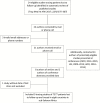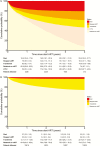Outcomes of Patients Lost to Follow-up in African Antiretroviral Therapy Programs: Individual Patient Data Meta-analysis
- PMID: 29889240
- PMCID: PMC6233676
- DOI: 10.1093/cid/ciy347
Outcomes of Patients Lost to Follow-up in African Antiretroviral Therapy Programs: Individual Patient Data Meta-analysis
Abstract
Background: Low retention on combination antiretroviral therapy (cART) has emerged as a threat to the Joint United Nations Programme on human immunodeficiency virus (HIV)/AIDS (UNAIDS) 90-90-90 targets. We examined outcomes of patients who started cART but were subsequently lost to follow-up (LTFU) in African treatment programs.
Methods: This was a systematic review and individual patient data meta-analysis of studies that traced patients who were LTFU. Outcomes were analyzed using cumulative incidence functions and proportional hazards models for the competing risks of (i) death, (ii) alive but stopped cART, (iii) silent transfer to other clinics, and (iv) retention on cART.
Results: Nine studies contributed data on 7377 patients who started cART and were subsequently LTFU in sub-Saharan Africa. The median CD4 count at the start of cART was 129 cells/μL. At 4 years after the last clinic visit, 21.8% (95% confidence interval [CI], 20.8%-22.7%) were known to have died, 22.6% (95% CI, 21.6%-23.6%) were alive but had stopped cART, 14.8% (95% CI, 14.0%-15.6%) had transferred to another clinic, 9.2% (95% CI, 8.5%-9.8%) were retained on cART, and 31.6% (95% CI, 30.6%-32.7%) could not been found. Mortality was associated with male sex, more advanced disease, and shorter cART duration; stopping cART with less advanced disease andlonger cART duration; and silent transfer with female sex and less advanced disease.
Conclusions: Mortality in patients LTFU must be considered for unbiased assessments of program outcomes and UNAIDS targets in sub-Saharan Africa. Immediate start of cART and early tracing of patients LTFU should be priorities.
Figures



References
-
- Joint United Nations Programme on HIV/AIDS. Fact sheet: latest statistics on the status of the AIDS epidemic, 2017. Available at: http://www.unaids.org/sites/default/files/media_asset/UNAIDS_FactSheet_ .... Accessed 10 November 2017.
-
- Joint United Nations Programme on HIV/AIDS. 90-90-90: an ambitious treatment target to help end the AIDS epidemic, 2014. Available at: http://www.unaids.org/en/resources/documents/2014/90–90–90. Accessed 10 November 2017.
Publication types
MeSH terms
Substances
Grants and funding
LinkOut - more resources
Full Text Sources
Other Literature Sources
Medical
Research Materials

